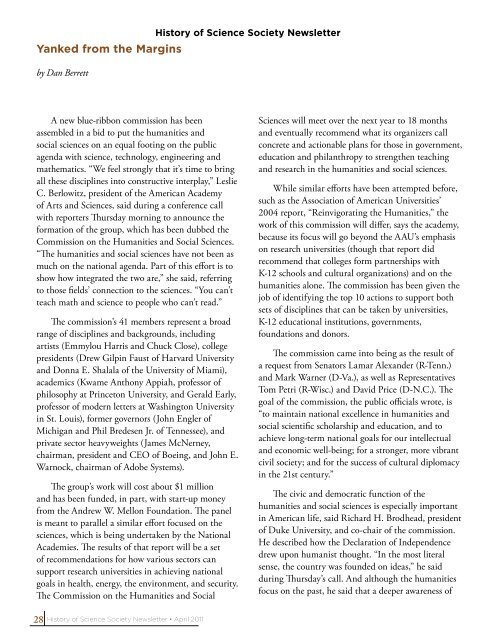Printer friendly version of Newsletter - History of Science Society
Printer friendly version of Newsletter - History of Science Society
Printer friendly version of Newsletter - History of Science Society
You also want an ePaper? Increase the reach of your titles
YUMPU automatically turns print PDFs into web optimized ePapers that Google loves.
Yanked from the Margins<br />
by Dan Berrett<br />
<strong>History</strong> <strong>of</strong> <strong>Science</strong> <strong>Society</strong> <strong>Newsletter</strong><br />
A new blue-ribbon commission has been<br />
assembled in a bid to put the humanities and<br />
social sciences on an equal footing on the public<br />
agenda with science, technology, engineering and<br />
mathematics. “We feel strongly that it’s time to bring<br />
all these disciplines into constructive interplay,” Leslie<br />
C. Berlowitz, president <strong>of</strong> the American Academy<br />
<strong>of</strong> Arts and <strong>Science</strong>s, said during a conference call<br />
with reporters Thursday morning to announce the<br />
formation <strong>of</strong> the group, which has been dubbed the<br />
Commission on the Humanities and Social <strong>Science</strong>s.<br />
“The humanities and social sciences have not been as<br />
much on the national agenda. Part <strong>of</strong> this effort is to<br />
show how integrated the two are,” she said, referring<br />
to those fields’ connection to the sciences. “You can’t<br />
teach math and science to people who can’t read.”<br />
The commission’s 41 members represent a broad<br />
range <strong>of</strong> disciplines and backgrounds, including<br />
artists (Emmylou Harris and Chuck Close), college<br />
presidents (Drew Gilpin Faust <strong>of</strong> Harvard University<br />
and Donna E. Shalala <strong>of</strong> the University <strong>of</strong> Miami),<br />
academics (Kwame Anthony Appiah, pr<strong>of</strong>essor <strong>of</strong><br />
philosophy at Princeton University, and Gerald Early,<br />
pr<strong>of</strong>essor <strong>of</strong> modern letters at Washington University<br />
in St. Louis), former governors (John Engler <strong>of</strong><br />
Michigan and Phil Bredesen Jr. <strong>of</strong> Tennessee), and<br />
private sector heavyweights (James McNerney,<br />
chairman, president and CEO <strong>of</strong> Boeing, and John E.<br />
Warnock, chairman <strong>of</strong> Adobe Systems).<br />
The group’s work will cost about $1 million<br />
and has been funded, in part, with start-up money<br />
from the Andrew W. Mellon Foundation. The panel<br />
is meant to parallel a similar effort focused on the<br />
sciences, which is being undertaken by the National<br />
Academies. The results <strong>of</strong> that report will be a set<br />
<strong>of</strong> recommendations for how various sectors can<br />
support research universities in achieving national<br />
goals in health, energy, the environment, and security.<br />
The Commission on the Humanities and Social<br />
<strong>Science</strong>s will meet over the next year to 18 months<br />
and eventually recommend what its organizers call<br />
concrete and actionable plans for those in government,<br />
education and philanthropy to strengthen teaching<br />
and research in the humanities and social sciences.<br />
While similar efforts have been attempted before,<br />
such as the Association <strong>of</strong> American Universities’<br />
2004 report, “Reinvigorating the Humanities,” the<br />
work <strong>of</strong> this commission will differ, says the academy,<br />
because its focus will go beyond the AAU’s emphasis<br />
on research universities (though that report did<br />
recommend that colleges form partnerships with<br />
K-12 schools and cultural organizations) and on the<br />
humanities alone. The commission has been given the<br />
job <strong>of</strong> identifying the top 10 actions to support both<br />
sets <strong>of</strong> disciplines that can be taken by universities,<br />
K-12 educational institutions, governments,<br />
foundations and donors.<br />
The commission came into being as the result <strong>of</strong><br />
a request from Senators Lamar Alexander (R-Tenn.)<br />
and Mark Warner (D-Va.), as well as Representatives<br />
Tom Petri (R-Wisc.) and David Price (D-N.C.). The<br />
goal <strong>of</strong> the commission, the public <strong>of</strong>ficials wrote, is<br />
“to maintain national excellence in humanities and<br />
social scientific scholarship and education, and to<br />
achieve long-term national goals for our intellectual<br />
and economic well-being; for a stronger, more vibrant<br />
civil society; and for the success <strong>of</strong> cultural diplomacy<br />
in the 21st century.”<br />
The civic and democratic function <strong>of</strong> the<br />
humanities and social sciences is especially important<br />
in American life, said Richard H. Brodhead, president<br />
<strong>of</strong> Duke University, and co-chair <strong>of</strong> the commission.<br />
He described how the Declaration <strong>of</strong> Independence<br />
drew upon humanist thought. “In the most literal<br />
sense, the country was founded on ideas,” he said<br />
during Thursday’s call. And although the humanities<br />
focus on the past, he said that a deeper awareness <strong>of</strong><br />
28 <strong>History</strong> <strong>of</strong> <strong>Science</strong> <strong>Society</strong> <strong>Newsletter</strong> • April 2011
















